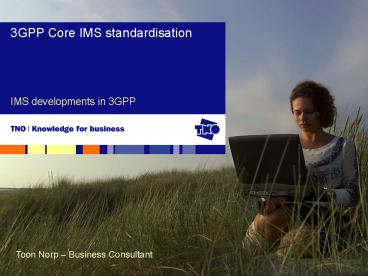IMS developments in 3GPP - PowerPoint PPT Presentation
1 / 13
Title:
IMS developments in 3GPP
Description:
at first targeted at mobile multimedia. IMS based on SIP protocol (IETF RFC3261) ... Telecom Italia, Telefonica, TeliaSonera, AT&T, NTT DoCoMo, Telenor, Telstra, SFR, ... – PowerPoint PPT presentation
Number of Views:72
Avg rating:3.0/5.0
Title: IMS developments in 3GPP
1
IMS developments in 3GPP
- 3GPP Core IMS standardisation
Toon Norp Business Consultant
2
IMS provides multimedia connections over IP
Application Server
IMS
Session control
IP access
IP access
Video Voice Data
Session
- IMS enables real time multimedia connections over
IP - Combinations of media, with associated QoS and
charging - Applications implemented on terminal and/or in
network make use of these connections - IMS is enabling technology
- IMS does not define particular services
3
IMS standardisation in 3GPP
- 3GPP started IMS standardisation in 2000
- at first targeted at mobile multimedia
- IMS based on SIP protocol (IETF RFC3261)
- 3GPP IMS specifications and SIP extensions define
how to use SIP in a telecommunications network - In 2002, the first IMS specifications where
frozen - 3GPP Release 5
IMS architecture 3GPP 23.002
4
IMS access independence
- IMS works on any IP connectivity access network
(IP-CAN) - On request from 3GPP2, 3GPP made IMS
specifications access independent from Release 6
onwards - Also other standards bodies indicated they wanted
to base themselves on 3GPP IMS specifications
Service Logic
...
Application Servers
Charging
Security
IP Multimedia Subsystem
QoS Control
...
IP transport network
...
UMTS
ADSL
Cable
5
Common IMS
- In 2007, with Common IMS it was agreed that 3GPP
would take overall responsibility of IMS
specifications - Avoid fragmentation of IMS specifications
- ETSI TISPAN IMS specifications moved to 3GPP in
2007 (www.3gpp.org/specs/TISPAN-IMS-transfer.htm) - All TISPAN Release 1 specs included as is in
3GPP Release 7 - Some TISPAN Release 2 specs merged with 3GPP
Release 8 - Harmonisation of 3GPP Rx and TISPAN Gq interface
TR23.822 - Also 3GPP2 MMD requirement specifications have
been merged with Release 8 - Last week, 3GPP SA1 meeting completed common IMS
harmonization for Release 8 (from ETSI TISPAN and
3GPP2) - From Release 9 onwards, 3GPP maintains one common
set of IMS specifications
6
Why is standardisation of IMS so important
- Telco approach
- All operators co-operate to provide a service
- One client / subscription
- Internet approach
- Little or no co-operation between services
- Multiple clients
Access
Access
Access
Access
Access
Telco operators need to look at IMS standards if
they want to provide more than VoIP
7
Rich Communication Suite
- The Rich Communication Suite Initiative is an
effort of a group of operators, network and
terminal vendors to launch a set of interoperable
services based on IMS - Operators Orange, Telecom Italia, Telefonica,
TeliaSonera, ATT, NTT DoCoMo, Telenor, Telstra,
SFR, SK Telecom - Vendors Nokia, Nokia Siemens Networks, Samsung
Sony-Ericsson,, Ericsson, Alcatel-Lucent,
Motorola, LG - Main features of Rich Communication Suite Phase 1
- Rich Call calls enhanced with media sharing
- Enhanced phone book, contacts enhanced with
capabilities and rich presence, - Enhanced messaging, conversational messaging
experience. - Plan is to have RCS devices in the shops in 2009
8
GSMA IPX
- With IPX, the GSM Association has defined a
global framework for international IMS
interconnect - First specifications in 2006
- Trials in 2006 and 2007
- Now first commercial deployments / announcements
- IPX Framework specifies dedicated network
infrastructure with - Security
- QoS
- Commercial model for interconnect
access
access
9
3GPP IMS developments IMS Centralized Services
(ICS)
- Description
- Providing services from a common IMS network
using CS access to transport voice services where
PS access is not suitable for VoIP - Allows migration of service control from CS
network to IMS network
- 3GPP spec
- TS 23.292
Common IMS network
PS access (full capability)
IMS services via PS access
PS access (no bi-directional voice)
IMS services with voice via CS access
CS access
IMS voice services via CS access
10
3GPP IMS developments Multimedia Session
Continuity
- Description
- Continuation of ongoing IMS sessions with
multiple media - across different access networks
- across different user equipments
- 3GPP spec
- TR 23.893
11
3GPP IMS developments IMS Service Brokering
- Description
- Enhancement of the current mechanisme of Service
Capability Interaction Management (SCIM) - Different approaches (centralised, distributed,
hybrid) - Enhancements of iFC mechanism
- 3GPP spec
- TR 23.810
12
What does TNO do in standardisation?
- Representation of customers in standardisation
- Influencing standard developement to defend
customer interests - Rapporting on standardisation progress
- Quarterly status reports
- QA sessions
- Workshops
- TNO knowledge building
- TNO builds standards knowledge to use in customer
projects - Technology assessment / impact analysis
- RFI / RFQ
- Architecture support
13
Thank you!































